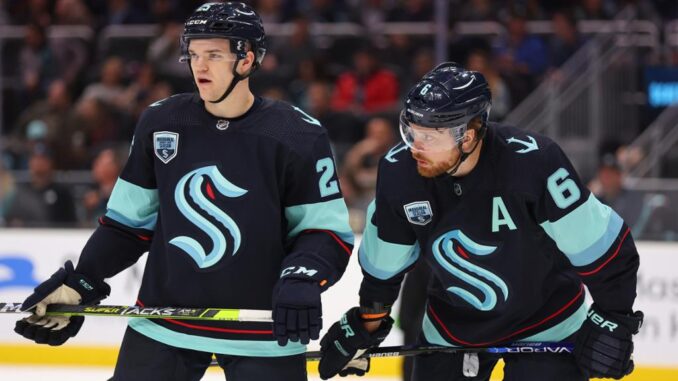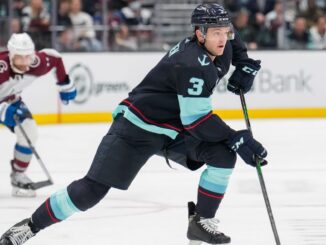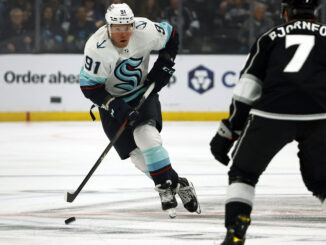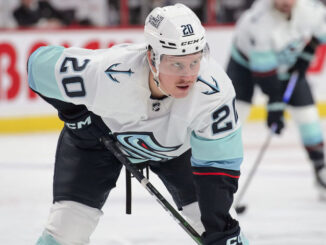
With the 2022 NHL Playoffs in full swing, what better time to look back on the season that was for the Seattle Kraken. The expansion franchise struggled mightily in its inaugural season and stumbled to a 27-49-6 record, finishing 30th overall. Some worrying patterns defined the Kraken’s 2021-22 campaign and offered clear areas of potential improvement, but rays of hope shone through despite the cloudy outlook. Let’s dig into a rundown of the trends and missteps which sent the Kraken sputtering, and how the team can move on from rock bottom.
Kraken Goaltenders Disappoint In Debut Season
No discussion of the Kraken’s season can be had without addressing the poor goaltending which plagued the team all year. With a combined cap hit of $9.4 million this season, the deals handed to Philipp Grubauer ($5.9 million), and Chris Driedger ($3.5 million) represent two of the heftier contracts awarded during last summer’s free agent frenzy.
Such a large financial outlay (fourth highest cap percentage allotted to goalies this season) meant that the Kraken hoped for a much better return on their sizeable investment at the position. Instead, their team save percentage (SV%) of .880 represented the NHL’s worst collective netminding performance, sinking the Kraken before they even dropped the anchor on their season. Grubauer, in particular, saw his play plummet one season removed from being named a Vezina Trophy finalist, posting the worst goals saved above expected mark (-32.4 GSAx) among all goaltenders.
In response, Seattle fired its goalie coach in an attempt to rejig the dynamic behind the scenes. It remains to be seen how much of a difference that will make as their two goaltenders posted decent results before joining the fledgling franchise. Both Grubauer (five years) and Driedger (two) still have multiple years remaining on their contracts, meaning any improvements must be internal. If the pair can regain some semblance of their previous form (.914 career SV% for Grubauer and .917 for Driedger), the Kraken can challenge for a playoff spot next season.
Kraken’s Expansion Draft Strategy Full of Regrets
It’s easy to bemoan roster decisions with the benefit of hindsight, but the Kraken made several baffling decisions at the expansion draft, passing on several players who enjoyed productive offensive seasons.
One of the most hotly debated decisions surrounded whether or not the team should select 30-year-old winger Vladimir Tarasenko from the St. Louis Blues. The Russian marksman boasted an established record of goalscoring with five seasons of at least 30 goals heading into 2021-22, but injury troubles limited him to only 34 regular-season games between 2019-20 and 2020-21. He would be owed $7.5 million until the conclusion of the 2022-23 season, representing more of a risk than the Kraken hoped to assume.
In a relatively healthy campaign, Tarasenko regained his previous form and tallied 34 goals and 82 points in 74 games, the best per-game output of his career. His total would pace the Kraken by seven goals, with Jared McCann leading Seattle with 27 markers this season. While the Kraken can’t be disappointed with picking the burgeoning offensive blueliner in Vince Dunn, Tarasenko becomes the most dangerous offensive weapon on the roster.
Elsewhere, the Philadelphia Flyers had a number of candidates to be plucked in the expansion process, with Jakub Voracek and James van Riemsdyk both left unprotected. Voracek (three years, $8.25 million per year) and van Riemsdyk (two years, $7-million per) carried somewhat cumbersome contracts and, at ages 32 and 33 respectively, were well out of their prime years. Still, Voracek eclipsed 60 points for the first time since 2018-19, and van Riemsdyk potted more than 20 since that same season.
Instead, they selected 24-year-old forward Carsen Twarynski, who spent the entire season in the American Hockey League (AHL), where he scored 18 points in 71 games. I’m not suggesting that either one of the two available Flyers make a sizeable difference on this season’s team, but they could use all the offensive skill that they can collect.
Adding Offensive Firepower Is Key Offseason Priority
One look at the team’s offensive standing compared to the rest of the league should denote where the Kraken’s offseason priorities should lie. They finished 28th in goals scored per game (2.6) and owned the 29th-ranked power play, which fired at a paltry 14.6% clip. McCann led the team in goals (27) and points (50), the lowest team-leading total in the NHL this season. At the very least, general manager Ron Francis knows that the lack of firepower upfront is an issue, promising an aggressive approach in free agency to bolster the Kraken’s forward ranks.
Related: Beniers’ NHL Debut Gives Seattle Kraken Hope For Bright Future
With a number of players on expiring contracts, the Kraken should have a boatload of cap space to play with this summer, with CapFriendly estimating about $22-million in cap room. Of the players set to hit unrestricted free agency, Johnny Gaudreau (115 points in 82 games), Nazem Kadri (87 in 71), and Filip Forsberg (42 goals in 69 games) are the most attractive high-end candidates. Elsewhere, Andre Burakovsky (61 points in 80 games) or Bryan Rust (58 in 60) represent a pair of more affordable options.
The Kraken can offer a higher salary than most teams as well as opportunities to feature in a more prominent role in the attack. For players who prioritize financial security over Stanley Cup chances, Seattle is an attractive option this summer.
Struggling Special Teams Sink Kraken
The Kraken’s poor performance on both special teams this season is loosely related to the goaltending woes and thin forward group, and their struggles in those areas contributed to their disappointing season. Both their power play (29th) and penalty kill (31st) ranked within the bottom five leaguewide, and their ineffectiveness wasn’t just the product of unfortunate puck luck.
The Kraken’s per-60 shot (21st) and chance quality generation (24th in xGF) represent bottom-third rates, and it’s no surprise that their 5.02 goals per-60 with the man advantage comes in at 30th overall. In terms of shorthanded play, the effect of Seattle’s awful goaltending comes to the forefront, although the team struggled to prevent quality chances against with any regularity. Despite owning the 22nd best xGA/60 mark at 8.01/60, they allowed the most goals against per-60 on the penalty kill, a wide chasm exacerbated by their crease-related struggles.
A regression back to something resembling Grubauer and Driedger’s career averages should buoy the team’s penalty kill success. Relatedly, injecting more skill into the lineup can only do wonders for an often-impotent power play unit. Whether those improvements are enough to earn a playoff spot remains to be seen.
Promising Young Pieces Ready To Take Next Step With Kraken
All in all, this season was a disaster for the Kraken from a competitive standpoint. They were never close to challenging for a playoff spot and spent the tail-end of the campaign trotting out a rotating lineup in the hopes of finding something that could stick for next season. Luckily for them, the future looks bright in Seattle.
The Kraken’s 2021 second-overall pick in Matty Beniers showed he could be the team’s top pivot as soon as next season with nine points in 10 games after joining up after the end of his collegiate career. Dunn and McCann look like solid supporting pieces, and the team will add whoever they select with the fourth-overall pick in the 2022 Entry Draft, not to mention the seven second rounders they own over the next two drafts. Their existence got off to a tortured start, but the best is yet to come.
Data courtesy of Evolving Hockey, Hockey Reference, and the NHL.




